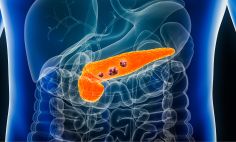January is National Thyroid Awareness Month, which brings attention to the small, butterfly-shaped gland in your neck.
The thyroid does a lot for your body. It makes hormones that keep organs running properly. It also controls the way you use energy: for example, how you burn calories and how fast your heart beats.
But sometimes this powerful gland doesn't work like it's supposed to.
One common thyroid condition, called hyperthyroidism, causes the thyroid to make more hormones than the body needs.
But the most common thyroid disorder is hypothyroidism, which affects about 4.6% of people in the U.S. This condition causes a lack of hormone, which leads the thyroid to slow down. People with hypothyroidism often gain weight and feel tired, but some may not have any symptoms at all.
Hashimoto's disease and hypothyroidism
The most common cause of hypothyroidism is Hashimoto's disease. It's an autoimmune disorder, meaning that the body's own immune system attacks the thyroid and causes inflammation. This prevents the thyroid from making enough hormones, causing hypothyroidism.
Hashimoto's disease often runs in families, and it affects women more than men. People with other autoimmune diseases are also more likely to get Hashimoto's disease.
Other causes
Other causes of hypothyroidism include thyroid surgery, radiation treatment, some medications, and thyroiditis (inflammation of the thyroid). Some people may be born with hypothyroidism, which is known as congenital hypothyroidism.
Women are more likely to have hypothyroidism, as well as people older than 60 and people with other thyroid disorders.
Symptoms
A person with mild hypothyroidism might feel fine and have no symptoms. But those with symptoms can experience a puffy face, sluggishness, weight gain, feeling cold, a slowed heart rate, constipation, depression, and thinning hair. Not everyone has the same symptoms, so make sure to talk with your health care provider if you think you have hypothyroidism.
Diagnosis
A doctor can diagnose hypothyroidism and help people manage it.
The doctor will ask about your symptoms, do a physical exam, and order blood tests. These tests measure your TSH, or thyroid stimulating hormone, level and antibodies. In Hashimoto's disease, high levels of antibodies in the blood show that the thyroid is being attacked by the immune system.
If you have an enlarged thyroid that's causing hypothyroidism, called a goiter, your doctor may order an ultrasound to see it better. In rare cases, you might need surgery, since an enlarged thyroid can make it hard to swallow.
Treatment
Hypothyroidism can usually be treated with an oral medication called levothyroxine. Levothyroxine replaces a hormone naturally produced by the thyroid gland to regulate the body's energy.
If your doctor prescribes levothyroxine, be sure to take it at the same time each day.
Your doctor may need to test the level of TSH in your body a few times to make sure the medication is working properly. TSH levels can change more during pregnancy, if you have heart disease, or if you take certain hormone therapies.







